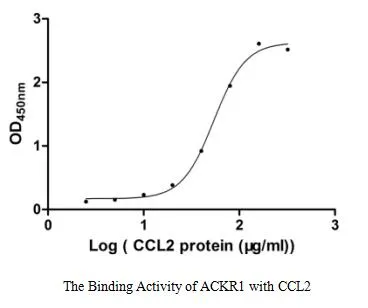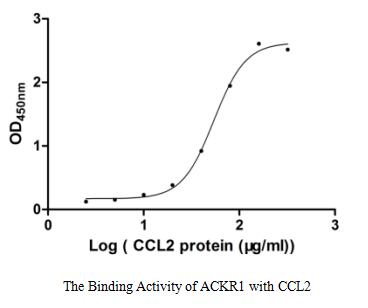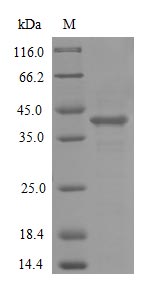Recombinant Human Atypical chemokine receptor 1 (ACKR1) (Active)
CAT:
399-CSB-CF624105HU-02
Size:
20 µg
Price:
Ask
- Availability: 24/48H Stock Items & 2 to 6 Weeks non Stock Items.
- Dry Ice Shipment: No








Recombinant Human Atypical chemokine receptor 1 (ACKR1) (Active)
- CAS Number: 9000-83-3
- Gene Name: ACKR1
- UniProt: Q16570
- Expression Region: 1-336aa
- Organism: Homo sapiens
- Target Sequence: MGNCLHRAELSPSTENSSQLDFEDVWNSSYGVNDSFPDGDYGANLEAAAPCHSCNLLDDSALPFFILTSVLGILASSTVLFMLFRPLFRWQLCPGWPVLAQLAVGSALFSIVVPVLAPGLGSTRSSALCSLGYCVWYGSAFAQALLLGCHASLGHRLGAGQVPGLTLGLTVGIWGVAALLTLPVTLASGASGGLCTLIYSTELKALQATHTVACLAIFVLLPLGLFGAKGLKKALGMGPGPWMNILWAWFIFWWPHGVVLGLDFLVRSKLLLLSTCLAQQALDLLLNLAEALAILHCVATPLLLALFCHQATRTLLPSLPLPEGWSSHLDTLGSKS
- Tag: N-terminal 10xHis-tagged
- Source: in vitro E.coli expression system
- Field of Research: Cardiovascular
- Assay Type: CF Transmembrane Protein & Active Protein & In Stock Protein
- Relevance: Atypical chemokine receptor that controls chemokine levels and localization via high-affinity chemokine binding that is uncoupled from classic ligand-driven signal transduction cascades, resulting instead in chemokine sequestration, degradation, or transcytosis. Also known as interceptor (internalizing receptor) or chemokine-scavenging receptor or chemokine decoy receptor. Has a promiscuous chemokine-binding profile, interacting with inflammatory chemokines of both the CXC and the CC subfamilies but not with homeostatic chemokines. Acts as a receptor for chemokines including CCL2, CCL5, CCL7, CCL11, CCL13, CCL14, CCL17, CXCL5, CXCL6, IL8/CXCL8, CXCL11, GRO, RANTES, MCP-1, TARC and also for the malaria parasites P.vivax and P.knowlesi. May regulate chemokine bioavailability and, consequently, leukocyte recruitment through two distinct mechanisms: when expressed in endothelial cells, it sustains the abluminal to luminal transcytosis of tissue-derived chemokines and their subsequent presentation to circulating leukocytes; when expressed in erythrocytes, serves as blood reservoir of cognate chemokines but also as a chemokine sink, buffering potential surges in plasma chemokine levels.
- Purity: Greater than 85% as determined by SDS-PAGE.
- Activity: Yes
- Bioactivity: Measured by its binding ability in a functional ELISA. Immobilized ACKR1 at 1 μg/ml can bind human CCL2, the EC50 of human CCL2 protein is 48.64-60.24 μg/ml.
- Length: Full Length
- Form: Liquid or Lyophilized powder
- Buffer: If the delivery form is liquid, the default storage buffer is Tris/PBS-based buffer, 5%-50% glycerol. If the delivery form is lyophilized powder, the buffer before lyophilization is Tris/PBS-based buffer, 6% Trehalose, pH 8.0.
- Reconstitution: We recommend that this vial be briefly centrifuged prior to opening to bring the contents to the bottom. Please reconstitute protein in deionized sterile water to a concentration of 0.1-1.0 mg/mL.We recommend to add 5-50% of glycerol (final concentration) and aliquot for long-term storage at -20℃/-80℃. Our default final concentration of glycerol is 50%. Customers could use it as reference.
- Molecular Weight: 41.1 kDa
- Storage Conditions: The shelf life is related to many factors, storage state, buffer ingredients, storage temperature and the stability of the protein itself. Generally, the shelf life of liquid form is 6 months at -20℃/-80℃. The shelf life of lyophilized form is 12 months at -20℃/-80℃.
